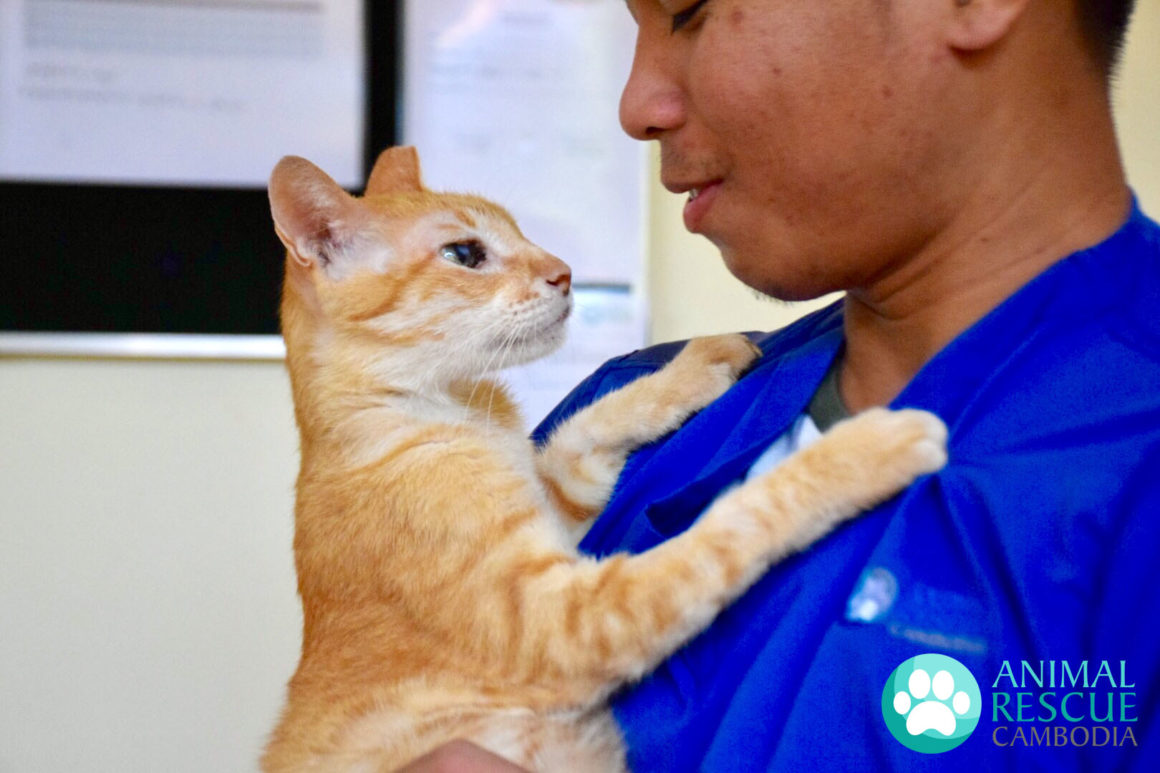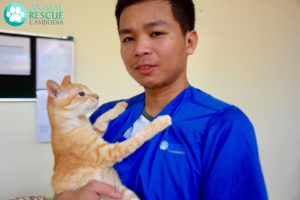ចុចត្រង់នេះដើម្បីអានអត្ថបទជាភាសាខ្មែរ។.
What is FIV? How does it affect cats?
Feline Immunodeficiency Syndrome (FIV) is an acquired virus, similar to Human Immunodeficiency Syndrome (HIV). For this reason it is often referred to as “kitty AIDS”.
It slowly compromises a cat’s immune system and weakens its defensive functions. Thus, the animal becomes more prone to secondary diseases and infections such as
- upper respiratory infections
- ringworm
- dental diseases
Although it may be tolerated well, in rare cases (less than 5%) the virus can eventually destabilize the whole immune system in its feline host by destroying certain types of cells. Sadly, there is no completely effective way of diminishing or curing FIV. A vaccine is available, although its efficacy remains uncertain.
Cats with FIV can live long and happy lives
Luckily, FIV is not often fatal for cats. With supportive medical care and a stress-free indoor living environment, cats with AIDS can have comfortable lives and enjoy many happy years ahead.
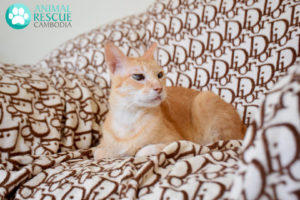
“Cats infected with FIV may not show symptoms until years after the initial infection occurred. Although the virus is slow-acting, a cat’s immune system is severely weakened once the disease takes hold. This makes the cat susceptible to various secondary infections. Infected cats receiving supportive medical care and kept in a stress-free, indoor environment can have relatively comfortable lives for months to years before the disease reaches its chronic stages.” (ASPCA)
Humans can NOT catch FIV!
FIV is not contagious to humans or other (non-feline) animals. So, it cannot be transmitted from a cat to a person. This means that we can share the same living space and freely interact with FIV-positive cats with ZERO risk to our health or the health of our children.
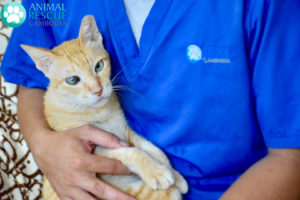
So, if you come across a FIV infected furry, there is absolutely no need to freak out, panic or avoid contact. You are totally safe!
However…other cats can get FIV
An active or passive FIV carrier (feline) can transmit the virus to other cats. This may happen through deep bite wounds, especially, during aggressive and bloody cat fights. If the virus is present in the infected cat’s saliva, it may enter the body tissues of a healthy cat and rapidly replicate cells. Also, pregnant females can pass it on to their offspring in uterus (even though such cases are comparatively rare).
HOW TO PROTECT AND CARE FOR A FIV POSITIVE CAT?
A positive FIV test should never be used as an argument for euthanizing a FIV+ kitten or adult cat. There have been many registered cases of false positive results. Such test results may indicate that the cat carries the antibody (which is harmless and can develop after the vaccination or antibiotic intake) but does not have the actual disease.
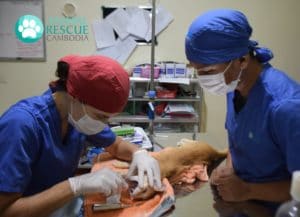
Yet, an animal with FIV can lead a healthy and content life with a certain set of rules in place.
- Aggressive or bad-tempered cats that have FIV should be kept indoors to protect other felines from contracting the disease.
- Cats with FIV can use same water/food bowls and litter boxes with very little chance of passing it on to other cats in the household. It is, however, advisable to keep your FIV+ cat indoors to minimize the risk of contracting the disease from other cat(s) in the neighborhood, and the other way round.
- It is highly recommended – and in some countries even required – to spay/neuter a FIV+ cat. Spaying/neutering is a necessary preventive and protective means. It helps to greatly reduce birthrate in FIV-positive cats and safeguard future litters/generations from acquiring the virus. Simply put, spaying effectively controls transmission of the disease and stops it from spreading further. De-sexing also helps to visibly lessen the adult cats’ urge to roam or engage in territorial fights, and has many other health benefits.
Please, don’t neglect or avoid FIV positive homeless cats. They are perfectly fine for adoption and can live in a home with other kitties with slim chances of passing the virus to them. FIV+ cats also need our love and care, just as all other living and helpless beings.
HOW MANY FIV CASES ARE IN CAMBODIA?
Around 3.5% of all cats worldwide are FIV carriers. However, only 5% of the overall cat-population globally faces a fatal outcome from FIV.
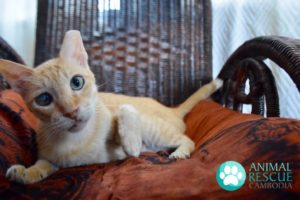
An NGO dealing with homeless animals in Pukhet (Thailand) released striking data. Their research showed that the number of FIV-positive cats registered in Pukhet alone was 13%.
For now, it is difficult to bring any concrete number of FIV infected cats in Cambodia. Simply because no such survey or baseline study has ever been produced. However, it is possible that Phnom Penh has even a slightly higher number of FIV+ cats than those in Pukhet, taking into account the overall cats’ population, birth/mortality rates, number of spayed and neutered per annum (animals), general sanitary situation and conditions, and other basic criteria (FIV cats – Malaysia study).
Stevie’s Story
In 2017, Stevie came to our ARC center for a general check-up, vaccinations and spaying. We were preparing to return him to the pagoda, but unfortunately he responded negatively to some of the treatment. Our vet ran additional tests to find out why, and sadly he was diagnosed with FIV.
FIV causes Stevie’s immune system to be a lot weaker than that of a healthy feline. He can easily catch other viruses or infections, he is more prone to frequent skin rashes, and must quickly see a vet if any new symptoms occur.
Stevie is a very intelligent and friendly cat, and we are happy he has found his long-term foster, Bronwyn. She accepted him with no hesitation and provided with everything he needs to stay healthy and active (and spoils him too!) And most importantly, she gives him the love and attention every FIV cat desires the most. A big thank you, Bronwyn!

